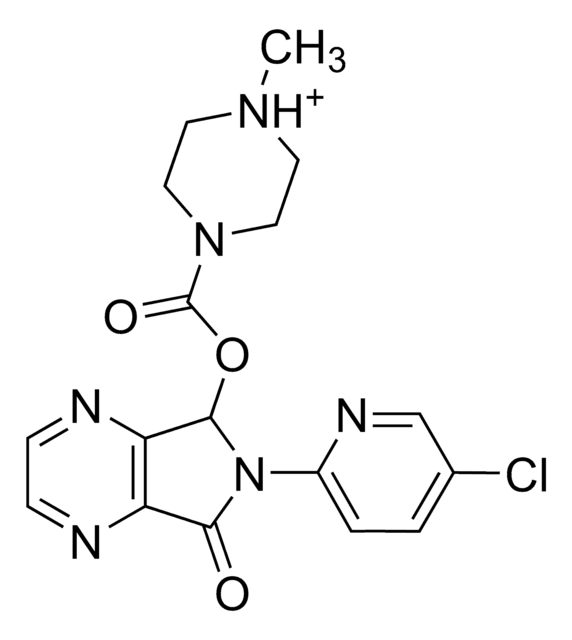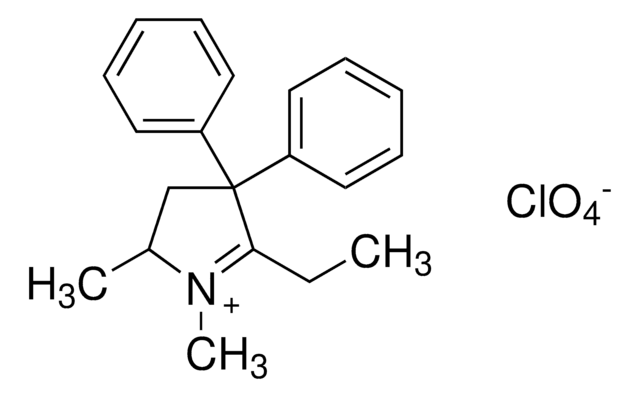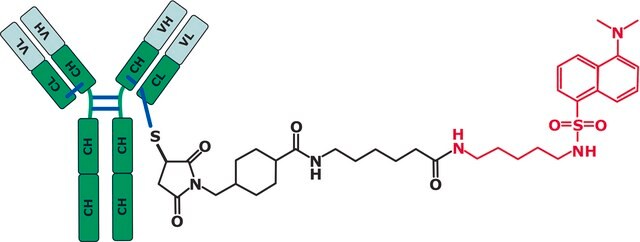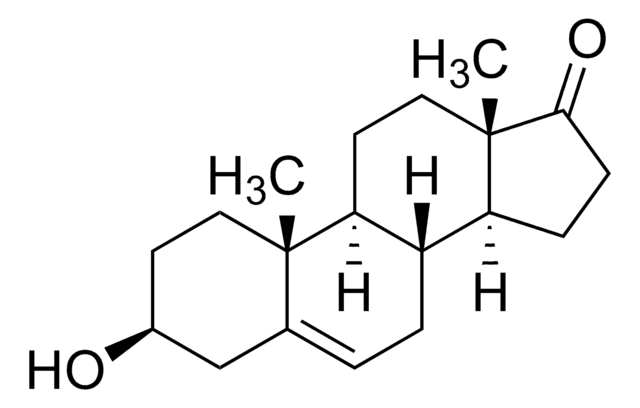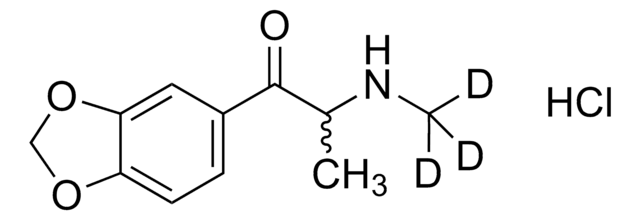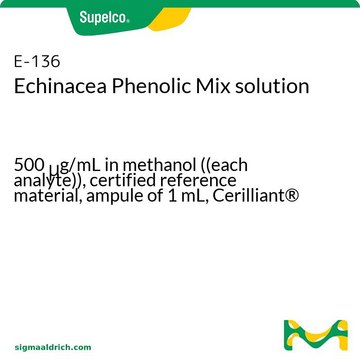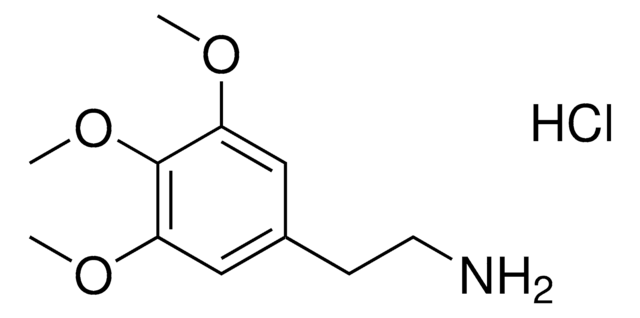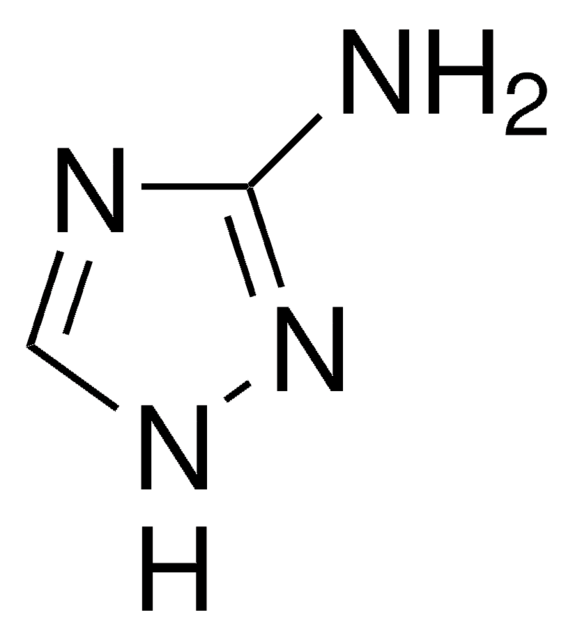B-045
Butylone hydrochloride solution
1.0 mg/mL in methanol (as free base), ampule of 1 mL, certified reference material, Cerilliant®
Synonym(s):
Butylone hydrochloride solution
About This Item
Recommended Products
grade
certified reference material
Quality Level
form
liquid
feature
SNAP-N-SPIKE®, SNAP-N-SHOOT®
packaging
ampule of 1 mL
manufacturer/tradename
Cerilliant®
drug control
Narcotic Licence Schedule D (Switzerland)
concentration
1.0 mg/mL in methanol (as free base)
technique(s)
gas chromatography (GC): suitable
liquid chromatography (LC): suitable
application(s)
forensics and toxicology
format
single component solution
storage temp.
−20°C
SMILES string
Cl.N(C(CC)C(=O)c1cc2c(cc1)OCO2)C
InChI
1S/C12H15NO3.ClH/c1-3-9(13-2)12(14)8-4-5-10-11(6-8)16-7-15-10;/h4-6,9,13H,3,7H2,1-2H3;1H
InChI key
KCJFEZQEDOBEOT-UHFFFAOYSA-N
General description
Application
- Neurochemistry Research: Butylone hydrochloride, a synthetic cathinone, is used to study psychoactive effects, aiding in the exploration of neurotransmitter activities in the brain and providing insights into mood regulation and brain function in response to synthetic compounds. https://doi.org/10.1016/j.forc.2023.100523
- Synaptic Transmission Research: Butylone hydrochloride is utilized to analyze its influence on synaptic transmission, particularly relevant in the study of addiction, mood disorders, and cognitive function, offering potential pathways for developing new therapeutic strategies in neuropsychiatric treatment. https://doi.org/10.24875/ric.23000110
- Biochemical Studies: Butylone hydrochloride is used in biochemistry to study drug metabolism and enzyme interactions, allowing precise dosage and delivery in experimental setups, and facilitating studies on drug efficacy and metabolism at the molecular level. https://doi.org/10.1016/j.dib.2018.10.073
Legal Information
Application
related product
Signal Word
Danger
Hazard Statements
Precautionary Statements
Hazard Classifications
Acute Tox. 3 Dermal - Acute Tox. 3 Inhalation - Acute Tox. 3 Oral - Flam. Liq. 2 - STOT SE 1
Target Organs
Eyes
Storage Class Code
3 - Flammable liquids
WGK
WGK 1
Flash Point(F)
49.5 °F - closed cup
Flash Point(C)
9.7 °C - closed cup
Regulatory Listings
Regulatory Listings are mainly provided for chemical products. Only limited information can be provided here for non-chemical products. No entry means none of the components are listed. It is the user’s obligation to ensure the safe and legal use of the product.
EU REACH Annex XVII (Restriction List)
Choose from one of the most recent versions:
Certificates of Analysis (COA)
Sorry, we don't have COAs for this product available online at this time.
If you need assistance, please contact Customer Support.
Already Own This Product?
Find documentation for the products that you have recently purchased in the Document Library.
Articles
As new “bath salt” drugs such as methylone, ethylone, mephedrone, butylone and other methcathinone analogs increase in popularity, toxicologists require native and labeled certified reference materials to accurately identify and quantify the new compounds in patient samples.
The combination of ion-exchange SPE with the HILIC HPLC separation provides a novel approach for the testing of problematic bath salt compounds.
This article highlights the impact that sample matrix effects can have on LC/MS response and discusses two novel approaches to reduce it.
Separation of Butylone hydrochloride solution, 1.0 mg/mL in methanol (as free base), ampule of 1 mL, certified reference material; Ethylone hydrochloride, 1.0 mg/mL in methanol (as free base), ampule of 1 mL, certified reference material; Mephedrone hydrochloride solution, 1.0 mg/mL in methanol (as free base), ampule of 1 mL, certified reference material; Methedrone hydrochloride solution, 1.0 mg/mL in methanol (as free base), ampule of 1 mL, certified reference material; Methylone hydrochloride, 1.0 mg/mL in methanol (as free base), ampule of 1 mL, certified reference material
Protocols
Separation of 3,4-Methylenedioxypyrovalerone HCl (MDPV) solution, 1.0 mg/mL in methanol (as free base), ampule of 1 mL, certified reference material; Buphedrone hydrochloride solution, 1.0 mg/mL in methanol (as free base), ampule of 1 mL, certified reference material; 3-Fluoromethcathinone hydrochloride solution, 1.0 mg/mL in methanol (as free base), ampule of 1 mL, certified reference material; Butylone hydrochloride solution, 1.0 mg/mL in methanol (as free base), ampule of 1 mL, certified reference material; Ethylone hydrochloride, 1.0 mg/mL in methanol (as free base), ampule of 1 mL, certified reference material; 4-Fluoromethcathinone hydrochloride solution, 1.0 mg/mL in methanol (as free base), ampule of 1 mL, certified reference material; Mephedrone hydrochloride solution, 1.0 mg/mL in methanol (as free base), ampule of 1 mL, certified reference material; Methylone hydrochloride, 1.0 mg/mL in methanol (as free base), ampule of 1 mL, certified reference material; Methedrone hydrochloride solution, 1.0 mg/mL in methanol (as free base), ampule of 1 mL, certified reference material
Chromatograms
application for HPLCOur team of scientists has experience in all areas of research including Life Science, Material Science, Chemical Synthesis, Chromatography, Analytical and many others.
Contact Technical Service